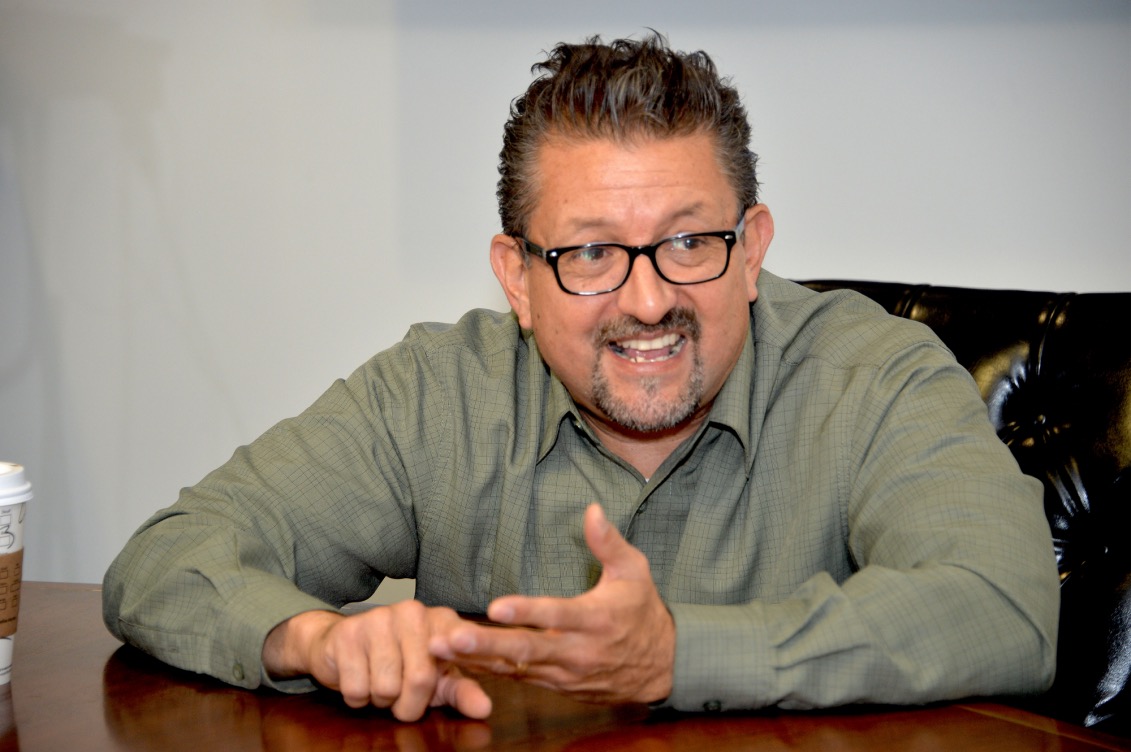
Activism in 2D With Cartoonist LaLo Alcaraz
LaLo Alcaraz speaks to AL DÍA News staff.
Lalo Alcaraz is no stranger to controversy. With a more than 22 year career in comics, no topic has been safe from his pen. From the Charlie Hebdo comic that went viral to his Muerto Mouse campaign against the Walt Disney Company, his cartoons have always come with a message and made great strides to challenge the thinking of those who view his comics everywhere. But despite his impact, he says he was never intent on challenging readers but giving them an avenue to push back against opposing political views.
“I think when I started, I wanted to simplify issues for people but I think I get too much credit. I’m not that smart. I don’t think I set out to simplify issues for the masses. It just kind of happened that way. [...] I’m not dictating an idea to them as a speech for them to read as a talking point - not that. But just to help them see it another way and then to be able to argue back against it,” Alcaraz stated.
It was at that time that Alcaraz took his personal dedication to activism and improving his community from the sidewalk to the page. “When I first became known as a cartoonist, it was during the L.A. Riots. I was still in grad school at Berkeley and trying to solidify myself in L.A. I participated in the protests, which eventually became the riots. That’s when L.A. Weekly brought me on as a syndicated comic, I think they were looking for my perspective,” said Alcaraz.
He saw cartooning as a way for him to empower the communities he was a part of but those he no longer protested with. “If they don’t feel empowered enough to push back, I’m waving a banner, or a flag and saying it’s ok to push back. What they’re saying is wrong and you’re righteous to disagree with that,” said Alcaraz.
His work has served not only as a tool for engagement but also as a symbol during the protests he used to be so active in before his career took off. “People would use my images in protests, marches. They would redraw them and blow them up - and art copying technology was not as advanced back then. And so they would march with my images in rallies, in protests, and marches, and stuff- demonstrations. And you know my thing was about pro-immigrant rights so I became known for that and then I evolved to cover all topics,” the artist said.
RELATED CONTENT
Despite his dedication to empowering the communities he’s a part of, the headway he has made in the mainstream comic industry has been slow to rise. While he has participated in both SoulCon and San Diego Comic Con, bridging the gap between what could be seen as a more segregated industry.
“We had the first Chicano art panel at San Diego Comic Con last year after 40 years of comic con you know and only because Logan Heights and… Now it’s a national landmark, they painted it with Chicano murals and everything…. That area is right next to Comic Con San Diego. And San Diego Comic Con is a non-profit organization and it has 20 million dollars of free cash every year.And people are starting to ask, ‘What are you doing with that cash? That cash should be spent within the community.’ So finally they had us, the local Chicano art community, come in and do a panel at Comic Con and I was a part of that. And I think people are starting to realize we should start being a little more accepting.”
But these invitations are often the former architects saving grace. Going across to speak at universities and comic cons across the U.S. he gets to engage with his audience outside of the hate mail he often receives. “Cartooning is one of the most solitary professions ever. It’s just you and this,” Alcaraz states as he gestures to drawing on the desk. “You can work from anywhere really. Still I was not meant to sit in the corner. I get bored. I was meant to do things and see things.”
And now as a traveling cartoonist as Alcaraz calls himself, the major criticism he gets from his work is that he’s selling out. Specifically with his work on Bordertown for Fox and Coco, the Pixar production on Dia de los Muertos, his work with larger companies that have a history of creating content that Alcaraz’s audience would find offensive has been a major controversy in his career. His response to that, however, is, “I haven’t changed, I’ve just expanded my scope,” Alcaraz stated. “They’re going to make the movie with me or not, it’s better with my input,” said Alcaraz of Coco which premiers in 2017.
“We’re still fighting for a place at the table,” Alcaraz stated.











LEAVE A COMMENT: